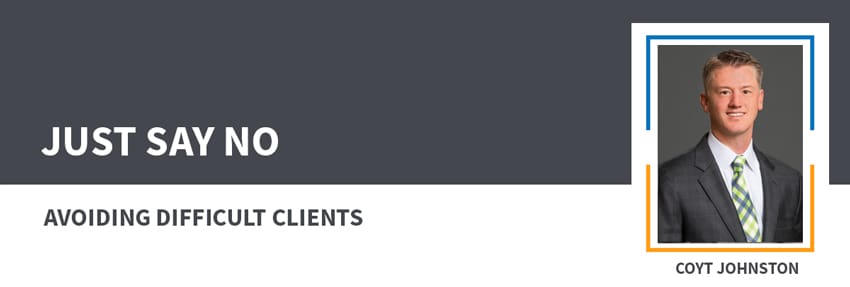
One of the hardest and most expensive things we do as lawyers is deal with difficult clients. We all have dream clients who make our jobs easy and enjoyable. These clients listen to us, heed our counsel, interact pleasantly with us, and pay their bills in full and on time. But for every yin, there is a yang; for every head, a tail. And knowing how to avoid the most difficult and costly representations can make all the difference in the world – both to your happiness and your bottom line.
Sometimes it is easy to identify a difficult client from a mile away. But often, what seemed like a dream client reveals themselves to be a nightmare well after representation is underway. The best way to avoid representing difficult clients is to identify and avoid them in advance. And that requires good screening.
Here are a few tips on screening clients:
Do your initial consult face-to-face.
It is very difficult to successfully accomplish the other items on this list over the phone or by email. From the potential client’s side, face-to-face communication shows the client that you are personally invested in their situation. From the lawyer’s side, there are clues about who the potential client is and how they operate that could easily be missed over the phone or by email.
Take your time and ask the tough questions.
Take your time and really get to know your potential clients and their legal situations—before you take them on as clients. Everyone is busy, and it is tough to spend non-billable time evaluating cases that you might not even take. But while this time might not make you money, it sure could save you a fortune.
Educate your potential client about what to expect.
Client expectations are the number one way that lawyers and clients get crosswise. You can solve this dilemma on the front end by being realistic with the client and explaining in detail all the ways the case can go right and wrong. It is certainly easier to get clients to sign up if you tell them what they want to hear. But nothing good happens when clients have unrealistic expectations.
In addition to educating clients on what they can expect from you, you can and should make sure the potential clients understand what you expect from them. Like all successful relationships, a good understanding of what is expected of and by the participants goes a long way.
Pay attention to their responses.
It does you no good to ask the right questions if you don’t listen to the responses. Listen to them and pay attention to not just what they say, but how they respond to the more difficult questions. People will tell you exactly who they are if you are just willing to listen.
Don’t be greedy.
Greed causes us to make bad decisions. This is a fundamental fact of human nature. It is true for the clients and it is true for the lawyers. Don’t let your greed override your judgment.
Learn from your mistakes and have a list of “red flags.”
This tip is self-explanatory. They say that those who don’t study history are doomed to repeat it. Study your own history. Look back at your own bad experiences and identify the signs you ignored until it was too late. Then create an ever-evolving list of red flags for bad clients
